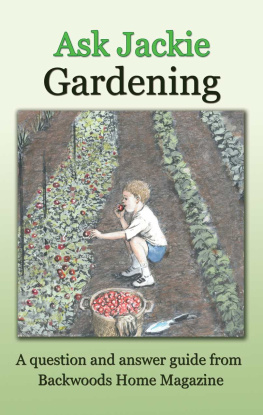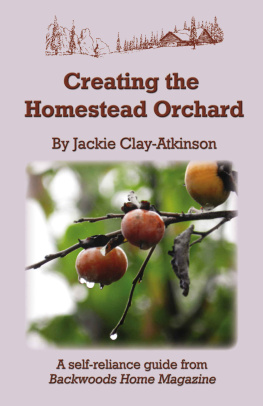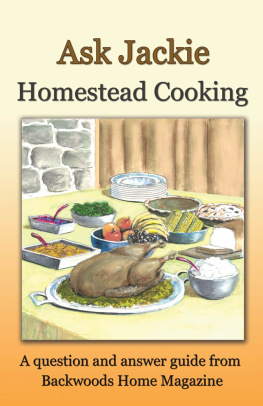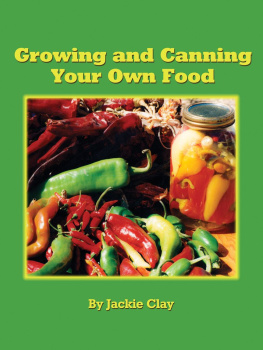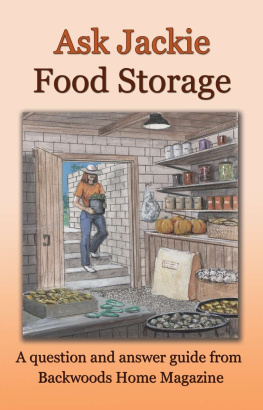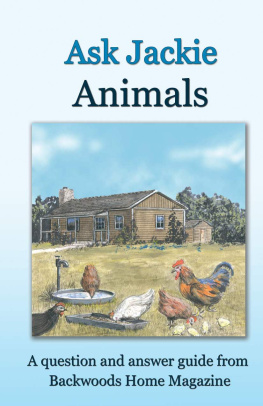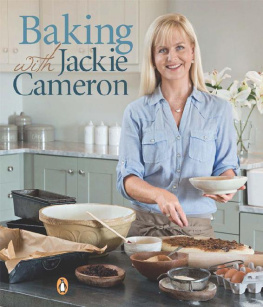Jackie Clay-Atkinson - Ask Jackie: Homesteading
Here you can read online Jackie Clay-Atkinson - Ask Jackie: Homesteading full text of the book (entire story) in english for free. Download pdf and epub, get meaning, cover and reviews about this ebook. year: 2012, publisher: Backwoods Home Magazine, genre: Home and family. Description of the work, (preface) as well as reviews are available. Best literature library LitArk.com created for fans of good reading and offers a wide selection of genres:
Romance novel
Science fiction
Adventure
Detective
Science
History
Home and family
Prose
Art
Politics
Computer
Non-fiction
Religion
Business
Children
Humor
Choose a favorite category and find really read worthwhile books. Enjoy immersion in the world of imagination, feel the emotions of the characters or learn something new for yourself, make an fascinating discovery.
- Book:Ask Jackie: Homesteading
- Author:
- Publisher:Backwoods Home Magazine
- Genre:
- Year:2012
- Rating:3 / 5
- Favourites:Add to favourites
- Your mark:
- 60
- 1
- 2
- 3
- 4
- 5
Ask Jackie: Homesteading: summary, description and annotation
We offer to read an annotation, description, summary or preface (depends on what the author of the book "Ask Jackie: Homesteading" wrote himself). If you haven't found the necessary information about the book — write in the comments, we will try to find it.
Jackie Clay-Atkinson: author's other books
Who wrote Ask Jackie: Homesteading? Find out the surname, the name of the author of the book and a list of all author's works by series.
Ask Jackie: Homesteading — read online for free the complete book (whole text) full work
Below is the text of the book, divided by pages. System saving the place of the last page read, allows you to conveniently read the book "Ask Jackie: Homesteading" online for free, without having to search again every time where you left off. Put a bookmark, and you can go to the page where you finished reading at any time.
Font size:
Interval:
Bookmark:
Table of Contents
Ask Jackie
Homesteading
Copyright 1999-2012
ISBN: 978-0-9860152-5-0
Backwoods Home Magazine
PO Box 712
Gold Beach, Oregon 97444
www.backwoodshome.com

Edited by Jessie Denning, Julia Denning, Haley Kessel, Connie Sayler, Lisa Nourse, Rhoda Denning, and Ilene Duffy
Cover art by Don Childers
Illustrations by Don Childers, Jessie Denning, and John Dean
Introduction
Theres a wide resurgence of modern homesteaders; folks who wish to be a lot more self-reliant and have a homestead that produces not only a great deal of the familys nutritious, gourmet-quality food, but is also conducive to a lifestyle independent of store-bought thinking. On our northern Minnesota homestead, we raise about 90% of our own food, from grains and vegetables to chickens, goats, pigs, and cattle. Our power comes from solar panels with a back-up generator. Our garden and orchard are irrigated from our own developed spring, and the wood we heat and cook with comes from our own property.
Luckily, there is a lot of interest in following our lifestyle to some extent. In this book, I answer a whole lot of questions on topics ranging from finding a homestead, getting started once youre there, avoiding problems, water systems, heating, generators, cheap alternative power, varmints, recipes, cooking with and handling cast iron cookware, homestead projects, and, of course, self-reliance and preparedness.
With todays economy spiraling downward, families are concerned with placing more dependence upon their shoulders when it comes to caring for themselves, particularly in preparing for any emergency or simple bad times that happen in everyones life. Stocking up with a pantry full of good things to eat, dry goods, medical supplies, and water is always a good idea. Its also smart to have a means to heat and light the home, should the power go down for any reason. All these things make good old common sense. Our great-grandparents did just that and now, so should we. It not only saves stress and worry, but builds increasing confidence in a familys ability to survive happily no matter what life throws at them.
Have fun reading. I hope I answer many of your own questions!
Jackie Clay
Getting started

Getting started
How does one dip their toe into self-reliant living to see if they really want it? I have a great job in biotech but the stress and fast paced life I live sometimes gets to me. I dont know if I am suffering from the grass is always greener on the other side syndrome or if this is a direction I truly want to go and opt out of the fast paced lifestyle. My background makes it very easy for me to teach as a potential source of income if I were to move and make a go of it. Do you have any advice on how I could try it out without making major changes in my life until I can conclude if I am just daydreaming or if this what I really want?
Joe Leonetti, California
Good thinking, Joe. But dont feel as if you need to leave it all and move to a remote location in order to be self-reliant. You can begin, right where you live now, as there are hundreds of ways a person can become more self-reliant anywhere. The quest for self-reliance is a path on which few people ever reach the end. Very few people are truly self-reliant, having to buy nothing, depending on no one. But the more we travel the path, the more satisfying our lives become.
Start out by growing at least something, whether it is in a few containers (like container tomatoes and peppers, or whatever you really like). And enjoy the fruit of your labor. If you have a yard, a piece of ground you can borrow or share, make a small garden. As you learn and succeed, you will feel a pull to do more as it is so satisfying to actually have taken charge of part of what you eat. And truly, everything home-raised does taste better.
Read! Read other peoples stories and how-to information in this and other magazines.
Begin building up a storage pantry. You dont have to buy hundreds of dollars worth of food at once. Just buy a few extras when they are on sale, being sure to buy some easily-stored staples, such as flour, shortening, sugar, dry beans, rice, etc., too.
Learn a few skills. Build a birdhouse, a dog house, a garden shed. Youll use the same skills to build a small (or large!) house. Learn to can food. Its easy and fun, too. I save tons of money every year by canning foods that we grow, hunt, and buy on sale.
Talk to people who are living a more self-reliant lifestyle. Visit their homes or homesteads and see if you feel at home. Offer to come help when they could use another hand. You can both learn skills and see if this life is what you crave.
Above all, dont be afraid to do it. I feel sorry for so many people who would really love to do it themselves on their own homestead, but are afraid to cut the umbilical cord and try something new for fear of failure. Its a great life or I wouldnt love it so much.
How can I be more self-sustaining?
How can I be more self-sustaining with what I have, as I cannot afford any more?
Now the background; I run 10 cows plus their calves and a bull on eight acres. I farm the other acre. Currently we can many types of veggies and are self-sufficient in water, beef, chickens/eggs, and veggies. But not the commodity grains.
We use the co-op for large amounts of wheat, corn, oats, beans, etc. As it is easier to use the co-op, I am really wondering if it would be possible to do this on a limited space as we have. I am very good at square foot gardening; but this would be intense.
I have learned to get more out of my gardening: For instance, planting corn every 3 inches on all sides. This keeps the weeds out and as long as it gets plenty of water, it works good.
Since I live in Texas, it is hard to store potatoes and things in the ground as the ants get to them or it rots due to the high temps in the summer.
I guess the biggest problem is that I have a real job that takes most of my time.
So I guess my question is twofold. How can food be stored at the higher Texas temperatures over the summers and how can I increase/estimate yields beforehand to cut my food bill even more?
Kevin Bradway
First, I have a question for you, Kevin. Do your 10 cows bring you in enough income to justify having 10 head on eight acres? Dont get me wrong. Ive had cattle nearly all my life, but when we went down to 20 acres (which isnt much cattle grazing in Montana), I went down to one cow. Otherwise we were buying too much feed, as we couldnt raise enough on such limited and marginally productive acreage.
I realize that in Texas, you probably get much more rainfall and have much better pasture than we did up in the mountains, but just think about it.
Yes, you can raise all of your familys grain needs, including that used for a modest-sized flock of chickens on very little land, using the intensive methods you are already familiar with. We have raised wheat, rye, beans, and corn for cornmeal and masa harina (corn flour) on less than a quarter of an acre. What we did, which helped build our storage pantry, was to concentrate on two crops a year, raising and saving surplus grain. For instance, one year I raised rye, wheat, and two types of beans. The next year it was wheat and corn. That little patch kept us in dry grains for a long time. This included nearly all of the grain we fed our twenty hens. Of course, we free-ranged them and fed them garden products, such as weeds, damaged veggies, and canning leftovers as well as squash, pumpkins, and other easy and bountiful crops.
Next pageFont size:
Interval:
Bookmark:
Similar books «Ask Jackie: Homesteading»
Look at similar books to Ask Jackie: Homesteading. We have selected literature similar in name and meaning in the hope of providing readers with more options to find new, interesting, not yet read works.
Discussion, reviews of the book Ask Jackie: Homesteading and just readers' own opinions. Leave your comments, write what you think about the work, its meaning or the main characters. Specify what exactly you liked and what you didn't like, and why you think so.


